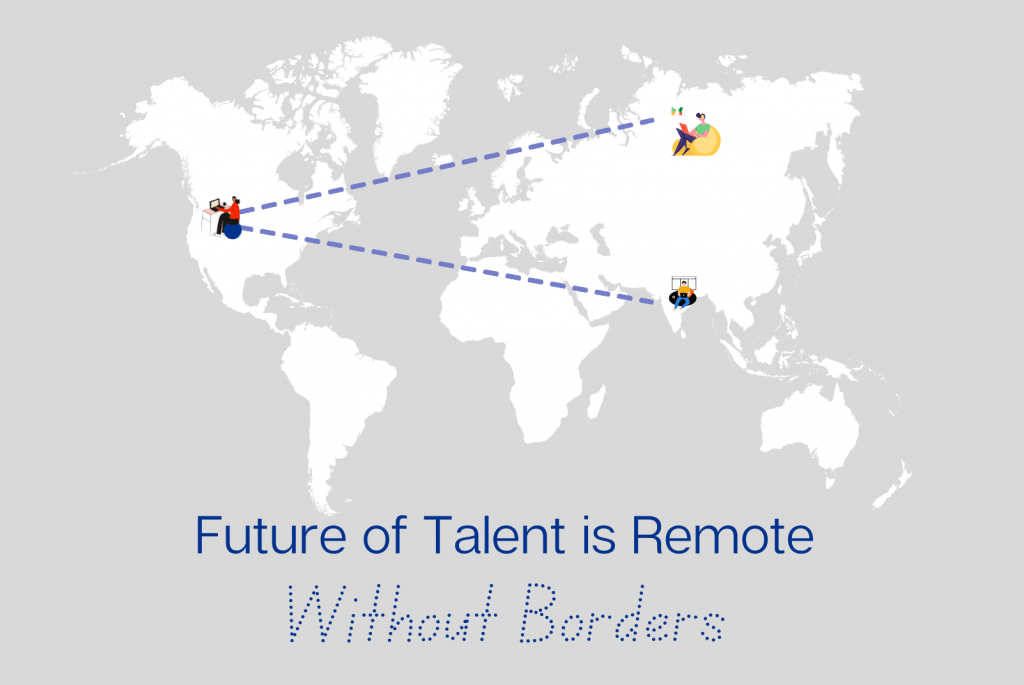As of 21st century, fourth Industrial Revolution is currently revolutionizing the world and challenging the conventional ways of businesses and work SOPs. From the invention of Printing Press in 15th century to the emergence of Internet, Machine Learning, Robotics etc., the world has witnessed it all. The most recent Covid19 pandemic is the practical vindication that old and conventional ways of working cannot sustain newer and upcoming challenges. Due to globalization, world is closely connected with the help of internet, social media platforms, online meeting platforms and so on. It’s wise to say that upcoming times requires new mode of working i.e. remote working. Let’s discuss why this is the time for remote working environment.
Moving Abroad for Foreign jobs has Lost its Charm:
One of the key sources of talent in developed economies has been immigration of talent from places like India, Eastern Europe, Latin America. According to Boston Consulting Group recent research on Global talent, in 2014 almost 75% of the people (survey correspondents) showed their willingness to move abroad for global working opportunities. However, the 2021 survey revealed that less than 50% of the people want to move abroad for working assignments. Now, this decrease is primarily due to various reasons:
- With the onset of digital revolution and fast and easily accessible internet, people are aware of remote job opportunities. So, they prefer to earn in foreign currency by working from their home country.
- Globalization and social media prevalence has made it possible for people to virtually see what abroad looks like. Now, people don’t have that curiosity which they had in pre Facebook and Instagram era.
- In underdeveloped countries, income tax ratio is quite less as compared to Europe, America and Canada. In developed countries, income tax ratio is around 20-45%. So, people who work remotely don’t have to pay such hefty taxes while earning in foreign currency.
- Remote working doesn’t require visa and other costs. Its beneficial for employee in the terms because getting visa is a luck and beneficial for employer because they don’t have to sponsor visa, accommodation and other expenses.
Why Remote Working trend is here to stay?
According to Forbes, by 2050, at least 70% of the workforce will be working from home for at least 5 days a week. Earlier companies offered remote work as a perk but during the Covid19 pandemic, it has become a necessity. Let’s ponder on why remote working is gaining popularity.
- Global talent pool: Todays companies are at War for Talent and companies need to find great talent at reasonable cost as well. Remote hiring helps you get great talent beyond your zipcode
- Remote jobs eliminate the need for large physical offices and its expenses i.e. utilities bills, rents, stationery bills, furniture cost, electronics and so on.
- Companies can spend this revenue on employee’s training programs etc. or can simply put this in company’s profits.
Let’s understand it this way. Two countries that are known for their amazing tech Talent are India and Ukraine. You can expand your team on demand basis with great talent from either of the countries. In India, an entry level Software Engineer 800 to 1300 USD. In Ukraine, an entry level Python developer earns between 1500-2100$ per month. While, an entry level Software Engineer in USA earns almost 6000-10000 USD per month, depending upon the organization the employee is working for. So, even, if a firm pays half of the salary to a remote employee, which it is paying to its on-site employee, then it will save 50%. While, the remote employee will get 200-300% more salary than he/she was earning in his home country. So, it is a win-win situation for both.
Having said that, remote teams bring with them a unique set of challenges.
Challenges with Remote working:
- The first and foremost challenge with remote working is the discovery of the “right” remote worker. Every company has a limited number of technical recruiters. Besides catering to all HR-related needs of employees, it will be a gruesome task for HR departments to do a massive scale employee hunt for remote hires and deal with all intricacies.
- Every country has different labour laws, tax laws, and work regulations. Current HR teams doesn’t specialize in understanding the legal requirements of different countries. Besides, it is not humanly possible for a single department to get into the nitty-gritty of every country’s laws.
- The culture and language gap can also play a significant obstacle in remote working scenario. So HR teams need to understand diverse work cultures to assimilate talent seamlessly.
Solution for Remote Working Challenges:
It is a famous phrase that “New Problems require New Solutions.” HR teams can overcome the above issues by closely collaborating with new-age remote talent-hiring platforms like ellow.io . These platforms specialize in hunting remote talent globally , vetting them and getting them on board. Furthermore, a remote talent-hiring platform like ellow.io will help HR managers to match the “right man for the right job” not just from technical skills but other skills like communication, fitment to culture etc. They will save the hustle of understanding legal requirements and shortlisting candidates from multiple geographical locations. With the help of new-age remote-talent hiring platforms, HR managers can find the most suitable candidate according to the company’s work environment and culture.
Summary:
Undoubtedly, the remote working trend is just in the beginning phase but it is here to stay. Everything comes with its pros and cons. But, to exploit the full advantage of remote working, governments have to make laws and regulation of remote foreign workers. The HR departments have to work closely with new-age remote talent-hiring platforms to create a sense of inclusivity in a diverse workface hailing from many different countries. For many organizations, they have to reengineer their work SOPs to cater the trend of remote working. But, the world will have to adjust with it because the future of talent knows no borders.









